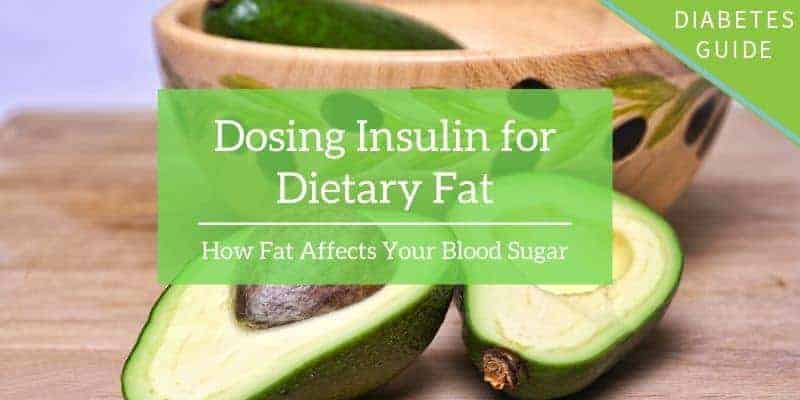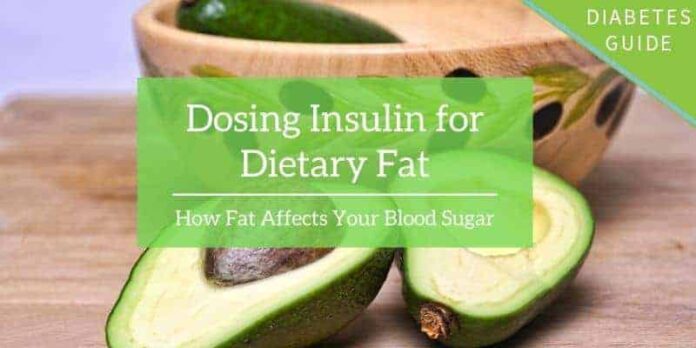The second we’re identified with diabetes, we’re taught that carbohydrates have the largest affect on our blood sugar — and that is true — however dietary fats and protein have an effect on your blood sugar, too.
We want fats in our eating regimen, for taste and well being, however as folks with diabetes, we want to concentrate on when and why it impacts our blood sugars, too.
On this article, we’ll talk about how dietary fats impacts your blood sugar ranges and your insulin wants.
What’s dietary fats?
Fats is a “macronutrient,” similar to carbohydrates and protein. Macronutrients are the only supply of energy and gas for the human physique!
Dietary fats accommodates 9 energy for each gram — greater than twice as a lot as protein and carbohydrates, at 4 energy per gram. However that doesn’t imply fats is unhealthy. Really, dietary fats is important on your long-term survival!
However dietary fats is not damaged down into glucose like carbohydrates (and typically protein). As a substitute, it’s damaged down into fatty acids. With out these fatty acids out of your eating regimen, your physique would finally fail to operate.
You want fats in your eating regimen to:
- Take up nutritional vitamins A, D, E, & Ok
- Protects your organs
- Keep wholesome development of pores and skin, hair, and nails
Dietary fats can be very satiating. For instance, consuming an apple by itself will depart you feeling hungry, however consuming an apple together with substantial fats from peanut butter or cheese will give your physique longer-lasting gas as a result of it takes longer to digest fats than carbohydrates.
How dietary fats impacts your blood sugar
A meal containing 8 grams of fats received’t have a noticeable affect in your blood sugar ranges, however consuming greater than 15 grams of fats in a single sitting or quick time period will create some bother when you’re not ready for it.
Let’s have a look…
Dietary fats can delay digestion by a couple of hours
If you eat a big serving of dietary fats in a single sitting, it should decelerate the digestion of the carbohydrates in your meal, too.
For individuals who don’t take insulin, this may typically truly assist stop post-meal spikes in your blood sugar.
For individuals who take insulin, this is usually a difficult factor to handle, as a result of it modifications the timing of when your physique wants insulin for that meal. When you take insulin whenever you begin consuming, like you might be usually instructed to do, the insulin will develop into lively in your bloodstream earlier than the carbohydrates are digested and damaged down into glucose.
As a substitute, it’s ideally suited to unfold your insulin dose out a bit. When you’re consuming a high-fat meal containing carbohydrates, Gary Scheiner, MS, CDE creator of Suppose Like a Pancreas suggests the next:
- Cut up your calculated insulin dose in half.
- Take the primary half of your dose whenever you start consuming.
- Take the second half of your dose 1 to 2 hours after you’ve completed consuming.
- For these utilizing an insulin pump, you are able to do this with an “prolonged bolus.”
- For these taking a number of day by day injections, you’ll be able to merely take two separate injections.
By spreading your meal dose out over a number of hours, you’re matching the speed of digestion of that high-fat meal.
Dietary fats can set off your liver to launch glucose, too!
Sadly, it’s not all the time so simple as splitting your insulin dose in half, due to actually high-fat meals — like pizza, Chinese language meals, or wealthy ice cream.
If you eat a meal containing 30 or extra grams of fats (which is simple to do with a couple of slices of pizza), that high-fat content material can affect your blood sugar for as much as 12 hours because of your liver.
Usually, your liver produces a really small quantity of glucose all day lengthy, 24 hours a day. This helps present your physique and your mind with the gas it wants whilst you sleep, and between meals.
The sugar produced by your liver comes from its “glycogen shops,” that are basically saved glucose. Your liver is designed to launch this “back-up” glucose as a supply of gas for different conditions, too, like throughout adrenaline-inducing curler coaster rides, soccer video games, nerve-racking arguments, daybreak phenomenon, and “battle or flight” fearful moments.
If you eat a really great amount of fats, your liver produces extra glucose due to insulin resistance. Your liver senses heightened ranges of insulin resistance because of the giant fats amount and tries to steadiness this by producing extra glucose.
That is usually suppressed by the presence of insulin — one thing non-diabetics handle routinely by producing extra insulin. In folks with diabetes, it means we have to take extra insulin for typically as much as 12 hours after a really fatty, heavy meal.
Gary Scheiner recommends a couple of methods of managing this:
- For pumps: set a short lived basal price enhance by 50 p.c for 8 hours after consuming.
- For injections: take an injection of NPH (lasts 8 to 10 hours) or Common (lasts 4 to six hours) insulin after consuming.
- On prime of splitting your meal dose, you’ll be able to add one other small injection of fast-acting insulin 4 hours after consuming.
Work along with your healthcare staff to determine the most effective method for you!
Why ketogenic diets can enhance your insulin wants
This glucose manufacturing from the liver can be why some folks see their insulin wants rise after they start following a ketogenic eating regimen. This may be very complicated and irritating contemplating low-carb and ketogenic diets are promoted as lowering your insulin wants and decreasing your blood sugar ranges.
For a lot of, that’s the case! However for some, it’s not that straightforward.
The intensely excessive fats consumption in a high-fat weight-reduction plan method at first means you want much less insulin as a result of there are so few carbohydrates, however it will possibly enhance your insulin wants by means of the insulin resistance created by the presence of dietary fats.
For some folks, this turns into tougher to handle than merely consuming a eating regimen containing extra carbohydrates. It will probably imply you might profit from a lower-carb, medium-fat, medium-protein eating regimen, as an alternative of a particularly excessive-fat eating regimen.
For others, a high-fat, low-carb eating regimen means they expertise smoother blood sugar ranges and decrease insulin doses total.
Regardless, you’ll have to determine what works greatest on your physique and work intently with an skilled endocrinologist or CDE to fine-tune your insulin-dosing method!


